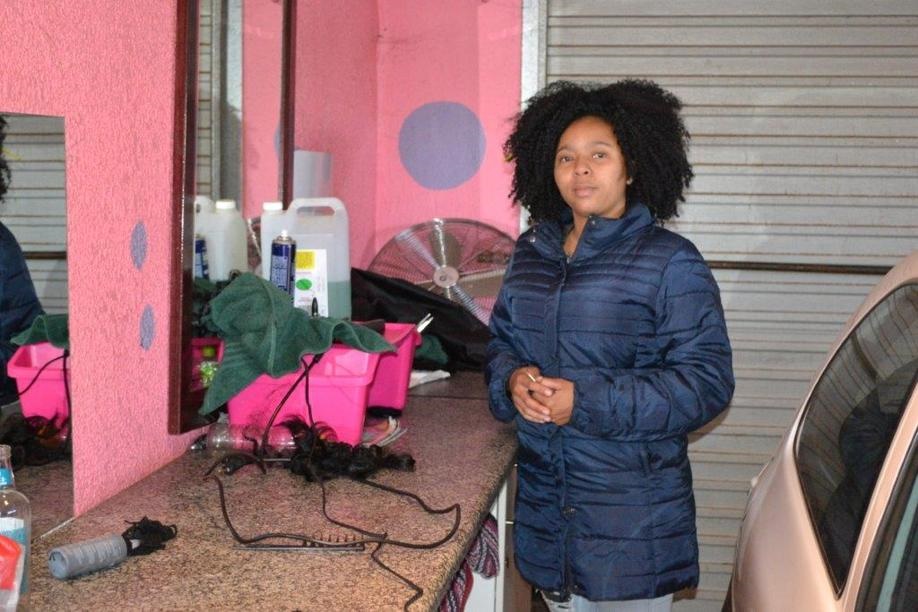
SA is celebrating Youth Month while reeling from the news that the country has slipped into a recession and amid Stats SA figures that indicate massive youth unemployment. In addition, the Global Competitiveness Report (2014/15) has found SA’s rate of entrepreneurial activity very low for a developing nation – a mere quarter of that seen in other sub-Saharan African countries. Even with high unemployment, the number of people starting businesses owing to having no other option for work – called necessity entrepreneurship – was low. Women’s entrepreneurship, primarily thanks to government support, grew slightly, but has remained alarmingly low compared with other sub-Saharan African countries. We spoke to youth entrepreneurs to gauge what made them not sit and wait for government jobs
'If you're smart, you can be somebody'
When Mcanthony Khoza (31) couldn’t find a job after working for one year as a civil engineering intern, he gave up the search and started something new.
He said he was aware that – in an impoverished rural area such as Driekoppies village near Malalane, Mpumalanga – job opportunities were few. So, he had to explore new ideas and be innovative.
According to the latest statistics contained in the provincial treasury’s socioeconomic report, Mpumalanga has an unemployment rate of 28.7%. Nkomazi local municipality – where Driekoppies is situated – has an unemployment rate of 18%. It is also afflicted by the second highest poverty level in the province, estimated at around 68%, and has the highest illiteracy rate.
Although he was completely broke, Khoza turned to friends and raised a loan of R20 000 to start a butchery in 2013.
The Tshwane University of Technology graduate told City Press that family members on his father’s side had been businesspeople. His grandfather and father had run their own butcheries and liquor stores in the village.
Khoza, however, had not inherited a cent from them and could not secure a bank loan when he ventured into his own butchery business. His father died when he was in high school. Consequently, he had to start his adult life with virtually nothing, he said.
“My mother was the kind of person who believed that I had to go to school and look for a job. My father, on the other, had told me that if you’re smart, you can make something out of yourself. That made me aware that there was always an opportunity around you, no matter the circumstances.
“I started with a [negative] budget. When my two friends lent me the money, they said they wanted it back within a month. Obviously, I couldn’t pay it back within such a short space of time, but in instalments over five months,” Khoza said.
Today Khoza employs four people. He started with one worker back in 2013.
He said he had applied for government funding for the first time this year to expand his business.
He has also found land where he plans to pursue his dream of building a shopping centre with a bigger butchery, a liquor store, a supermarket and a petrol station. He said he had applied for R9.5 million from the Small Enterprise Development Agency for this new project, which will see him increase his workforce to 25 people.
'Everyone is born with a talent'
Puleng Tsotetsi shocked her family when she dropped out of varsity to start a hair salon business.
When she got frustrated by the financial challenges of studying that afflicted her family, the young entrepreneur (23) of Phake section in Katlehong, Ekuruleni, left university where she had been studying human resources after just a year to start her salon.
Tsotetsi said she was only nine when she started dreaming of becoming a hairstylist, while playing with her dolls. She later started experimenting on her friends’ hair.
“I would start plaiting a friend’s hair and others would come and ask me to do theirs too. I did this while still in primary school and I started to charge people anything from R10 to R15,” Tsotetsi said.
By the time she went to high school, her customer numbers had rapidly increased. Her clientele was mostly younger, working women from around the Katlehong township, who flocked to her grandparents’ house where she had set up shop.
Her business had to be put on hold for a year when she went to university. When she gave up her studies, she restarted her business and worked from early morning to midnight.
With the help of her grandmother, she built an additional room from where she now runs her business. She also started investing in hair-related equipment in an effort to give her business a more professional look and feel.
“It was a bit-by-bit acquisition until I got everything [I needed]. I also bought my gran furniture to show my appreciation, as well as a stand in Vosloorus. The plan is to move out next year and run my business from there,” she said.
Tsotetsi has trained and created employment for two other young hairstylists. During holidays or the festive season, she ropes in six more women to help with the extra demand, she said.
Tsotetsi plans to attend a beauty school to learn more about her craft, after which she would like to expand her business across the townships of Katlehong, Thokoza and Vosloorus.
Today, Tsotetsi drives her own vehicle. She believes the young people of South Africa have the potential to succeed if they remained focused and put their hearts into it.
She said she did not believe that today’s young people were doomed in any way – even in the midst of gross unemployment.
“Everyone is born with talent. Discover yours, nurture it and embrace it,” she said.
'Young people should chase their dreams'
Buhle Mavimbela has proven to herself that necessity is the mother of invention.
Circumstances forced her to find alternative ways of earning a sustainable income for her family after being unemployed for a year, despite holding a BCom degree from the University of Limpopo, which she obtained in 2015.
The 24-year-old Mavimbela of Kabokweni in the Ehlanzeni district municipality in Mpumalanga could no longer “sit and wait for government jobs”, as she was confronted by the scarcity of work opportunities in her hometown and in South Africa in general.
“Many of us young graduates sit at home [despite our] qualifications,” she said.
Using her commercial skills, she identified a gap in the market for women’s hairstyles. She found that they desperately needed hair products and wigs that were different from the usual styles that were being imported.
She established Instant Hair by Buhle, using her home’s back room, in October last year.
“I had no choice because all the companies I approached wanted “experience”. Where would I get that while at varsity?”
She was also feeling pressure from family who had invested in her education, only for her to end up sitting idly at home, still dependent on them.
She said she noticed that most hair salon owners were struggling to source material, and those who managed often had to get these products from faraway locations. Her plan was to design her own products. These have since become a favourite with customers and her wigs are proving popular.
“I have even given my designs names such as the Licia Wig, Soul Afro, Mini Soul Afro and Bouncy Curls,” she said.
“My aim is to give African women back their African look. The Afros are inspired by the old trends of the likes of Ma’ Winnie [Madikizela-Mandela] and Miriam Makeba, which made me fall in love with the hair business,” she said.
“[The business] is slowly growing, and I am happy that it is helping my people. I do not have sponsors yet, but I am willing to take it to places,” she said.
Mavimbela urged young graduates to be innovators and to try their own ideas instead of thinking they have been forgotten by government.
“I believe in women empowerment and I want to implore young people to chase their dreams,” she said.




 Publications
Publications
 Partners
Partners












